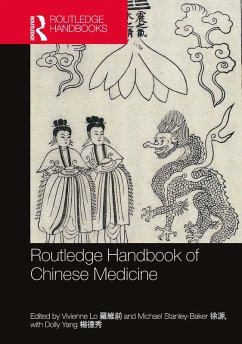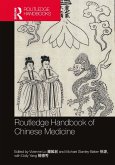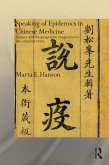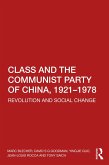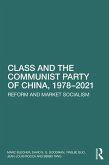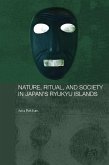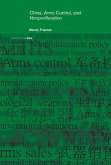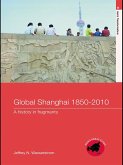Routledge Handbook of Chinese Medicine (eBook, ePUB)
Redaktion: Lo, Vivienne; Stanley-Baker, Michael
0,00 €
0,00 €
inkl. MwSt.
Sofort per Download lieferbar

0 °P sammeln
0,00 €
Als Download kaufen

0,00 €
inkl. MwSt.
Sofort per Download lieferbar

0 °P sammeln
Jetzt verschenken
Alle Infos zum eBook verschenken
0,00 €
inkl. MwSt.
Sofort per Download lieferbar
Alle Infos zum eBook verschenken

0 °P sammeln
Routledge Handbook of Chinese Medicine (eBook, ePUB)
Redaktion: Lo, Vivienne; Stanley-Baker, Michael
- Format: ePub
- Merkliste
- Auf die Merkliste
- Bewerten Bewerten
- Teilen
- Produkt teilen
- Produkterinnerung
- Produkterinnerung

Bitte loggen Sie sich zunächst in Ihr Kundenkonto ein oder registrieren Sie sich bei
bücher.de, um das eBook-Abo tolino select nutzen zu können.
Hier können Sie sich einloggen
Hier können Sie sich einloggen
Sie sind bereits eingeloggt. Klicken Sie auf 2. tolino select Abo, um fortzufahren.

Bitte loggen Sie sich zunächst in Ihr Kundenkonto ein oder registrieren Sie sich bei bücher.de, um das eBook-Abo tolino select nutzen zu können.
The Routledge Handbook of Chinese Medicine is an extensive guide to the nature of traditional medicine and healing in the Chinese cultural region, its plural epistemologies, and its portrayal from the beginning of the empire in the third century BCE to the globalisation of Chinese products and practices in the present day.
- Geräte: eReader
- ohne Kopierschutz
- eBook Hilfe
- Größe: 17.61MB
Andere Kunden interessierten sich auch für
![Routledge Handbook of Chinese Medicine (eBook, PDF) Routledge Handbook of Chinese Medicine (eBook, PDF)]() Routledge Handbook of Chinese Medicine (eBook, PDF)0,00 €
Routledge Handbook of Chinese Medicine (eBook, PDF)0,00 €![Speaking of Epidemics in Chinese Medicine (eBook, ePUB) Speaking of Epidemics in Chinese Medicine (eBook, ePUB)]() Marta HansonSpeaking of Epidemics in Chinese Medicine (eBook, ePUB)54,95 €
Marta HansonSpeaking of Epidemics in Chinese Medicine (eBook, ePUB)54,95 €![Class and the Communist Party of China, 1921-1978 (eBook, ePUB) Class and the Communist Party of China, 1921-1978 (eBook, ePUB)]() Marc BlecherClass and the Communist Party of China, 1921-1978 (eBook, ePUB)37,95 €
Marc BlecherClass and the Communist Party of China, 1921-1978 (eBook, ePUB)37,95 €![Class and the Communist Party of China, 1978-2021 (eBook, ePUB) Class and the Communist Party of China, 1978-2021 (eBook, ePUB)]() Marc BlecherClass and the Communist Party of China, 1978-2021 (eBook, ePUB)39,95 €
Marc BlecherClass and the Communist Party of China, 1978-2021 (eBook, ePUB)39,95 €![Nature, Ritual, and Society in Japan's Ryukyu Islands (eBook, ePUB) Nature, Ritual, and Society in Japan's Ryukyu Islands (eBook, ePUB)]() Arne RøkkumNature, Ritual, and Society in Japan's Ryukyu Islands (eBook, ePUB)58,95 €
Arne RøkkumNature, Ritual, and Society in Japan's Ryukyu Islands (eBook, ePUB)58,95 €![China, Arms Control, and Non-Proliferation (eBook, ePUB) China, Arms Control, and Non-Proliferation (eBook, ePUB)]() Wendy FriemanChina, Arms Control, and Non-Proliferation (eBook, ePUB)48,95 €
Wendy FriemanChina, Arms Control, and Non-Proliferation (eBook, ePUB)48,95 €![Global Shanghai, 1850-2010 (eBook, ePUB) Global Shanghai, 1850-2010 (eBook, ePUB)]() Jeffrey N WasserstromGlobal Shanghai, 1850-2010 (eBook, ePUB)48,95 €
Jeffrey N WasserstromGlobal Shanghai, 1850-2010 (eBook, ePUB)48,95 €-
-
-
The Routledge Handbook of Chinese Medicine is an extensive guide to the nature of traditional medicine and healing in the Chinese cultural region, its plural epistemologies, and its portrayal from the beginning of the empire in the third century BCE to the globalisation of Chinese products and practices in the present day.
Dieser Download kann aus rechtlichen Gründen nur mit Rechnungsadresse in A, B, BG, CY, CZ, D, DK, EW, E, FIN, F, GR, HR, H, IRL, I, LT, L, LR, M, NL, PL, P, R, S, SLO, SK ausgeliefert werden.
Produktdetails
- Produktdetails
- Verlag: Taylor & Francis eBooks
- Seitenzahl: 796
- Erscheinungstermin: 19. Juni 2022
- Englisch
- ISBN-13: 9781135008963
- Artikelnr.: 64163745
- Verlag: Taylor & Francis eBooks
- Seitenzahl: 796
- Erscheinungstermin: 19. Juni 2022
- Englisch
- ISBN-13: 9781135008963
- Artikelnr.: 64163745
- Herstellerkennzeichnung Die Herstellerinformationen sind derzeit nicht verfügbar.
Vivienne Lo ¿¿¿ is Professor of Chinese History at University College London. She has published widely on the ancient and medieval history of medicine in China and in diaspora. Her research interests include medical manuscripts, medical imagery and the history of nutrition. Michael Stanley-Baker ¿¿ is Assistant Professor in History at the School of Humanities, and of Medical Humanities at the Lee Kong Chian School of Medicine, at Nanyang Technological University, Singapore. An historian of Chinese medicine and religion, particularly Daoism, he works on the early imperial period as well as contemporary Sinophone communities. Currently completing a monograph on medicine and religion as related genres of practice in China, he also produces digital humanities tools and datasets to study the migration of medicine across spatio-temporal, intellectual and linguistic boundaries. Dolly Yang ¿¿¿ is a postdoctoral research associate at the Institute of History and Philology, Academia Sinica, Taiwan. She received a PhD in 2018 from University College London for her investigation into the institutionalisation of therapeutic exercise in Sui China (581-618 CE). She has a particular interest in examining the use of non-drug-based therapy in early medieval China, allied to a passion for translating and analysing ancient Chinese medical and self-cultivation texts.
Part 1: Longue Durée and Formation of Institutions and Traditions, 1. Yin, Yang and Five Agents (Wuxing) in the Basic Questions and Early Han (202 BCE-220 CE) Medical Manuscripts, 2. Qi : a Means for Cohering Natural Knowledge, 3. Re-envisioning Chinese Medicine: the view from archaeology, 4. The Importance of Numerology, Part I: state ritual and medicine, 5. The Importance of Numerology, Part II: medicine: an overview of the application of numbers in Huangdi neijing, 6. Therapeutic Exercise in the Medical Practice of Sui China (581-618 CE), 7. The Canonicity of the Yellow Emperor's Inner Classic: Han through Song, 8. Pre-standardised Pharmacology: Han through Song, 9. Chace, C. 'Developments in Chinese Medicine from the Song through the Qing', Part 2: Sickness and Healing, 10. Ancient Pulse Taking, Complexion and the Rise of Tongue Diagnosis in Modern China, 11. Case Records Yi'an, 12. Acupuncture Illustrations, 13. Anatomy and Surgery, 14. History of Disease: pre-Han to Qing, 15. Pre-modern Madness, 16. Late Imperial Epidemiology, Part 1: from retrospective diagnosis to epidemics as diagnostic lens for other ends, 1870s to 1970s, 17. Late Imperial Epidemiology, Part 2: new material and conceptual methods, 1980s to 2010s, 18. Folk Medicine of the Qing and Republican Periods: a review of therapies in Unschuld's Berlin Manuscripts, Part 3: Food and Sex, 19. What not to Eat - How Not to Treat: medical prohibitions, 20. Chinese Traditional Medicine and Diet, 21. Food and Dietary Medicine in Chinese Herbal Literature and Beyond, 22. The Sexual Body Techniques of Early and Medieval China: Underlying Emic Theories and Basic Methods of a Non-Reproductive Sexual Scenario for Non-Same-Sex Partners, 23. Sexing the Chinese Medical body: pre-modern Chinese medicine through the lens of gender, 24. Gynaecology and Obstetrics from the Tang to the early 21st century, 25. The Question of Sex and Modernity in China, Part 1: from xing to sexual cultivation, 26. The Question of Sex and Modernity in China, Part 2: from new ageism to sexual happiness Part 4: Spiritual and Orthodox Religious Practices, 27. Daoism and Chinese Medicine, 28. Buddhist Medicine: overview of concepts, practices, texts and translations, 29. Time in Chinese Alchemy, 30. Daoist Sexual Practices for Health and Immortality for Women, 31. Junqueira, L.F.B. Numinous Herbs: stars, spirits and medicinal plants in Late Imperial China, Part 5: The World of Sinographic Medicine: a diversity of interlinked traditions, 32. Transmission of Persian Medicine into China across the Ages, 33. Vietnam in the Pre-Modern Period, 34. History and Characteristics of Korean Medicine, 35. Chinese-style Medicine in Japan, 36. A Brief History of Chinese Medicine in Singapore, 37. Minority Medicine, Part 6: Wider Diasporas, 38. Early Modern Reception in Europe: translations and transmissions, 39. The Emergence of the Practice of Acupuncture on the Medical Landscape of France and Italy in the Twentieth Century, 40. Entangled Worlds: Traditional Chinese Medicine in the United States, 41. The Migration of Acupuncture through the Imperium Hispanicum: case studies from Cuba, Guatemala and the Philippines, 42. Long and Winding Roads: the transfer of Chinese medical practices to African contexts, 43. Translating Chinese Medicine in the West: language, culture, and practice, Part 7: Negotiating Modernity, 44. The Declaration of Alma Ata: the global adoption of a Maoist model for Universal Healthcare, 45. Communist Medicine: the emergence of TCM and barefoot doctors, leading to contemporary medical markets, 46. Contested Medicines in Twentieth-Century China, 47. Public Health in Twentieth-Century China, 48. Encounters with Linnaeus? Modernisation of Pharmacopoeia through Bernard Read and Zhao Yuhuang up to the Present, 49. Yangsheng in the Twenty First Century: embodiment, belief and collusion, 50. Liquorice and Chinese Herbal Medicine: an epistemological challenge, 51. Decontextualised Chinese Medicines: their use as health foods and medicines in the 'global North'
Part 1: Longue Durée and Formation of Institutions and Traditions, 1. Yin, Yang and Five Agents (Wuxing) in the Basic Questions and Early Han (202 BCE-220 CE) Medical Manuscripts, 2. Qi : a Means for Cohering Natural Knowledge, 3. Re-envisioning Chinese Medicine: the view from archaeology, 4. The Importance of Numerology, Part I: state ritual and medicine, 5. The Importance of Numerology, Part II: medicine: an overview of the application of numbers in Huangdi neijing, 6. Therapeutic Exercise in the Medical Practice of Sui China (581-618 CE), 7. The Canonicity of the Yellow Emperor's Inner Classic: Han through Song, 8. Pre-standardised Pharmacology: Han through Song, 9. Chace, C. 'Developments in Chinese Medicine from the Song through the Qing', Part 2: Sickness and Healing, 10. Ancient Pulse Taking, Complexion and the Rise of Tongue Diagnosis in Modern China, 11. Case Records Yi'an, 12. Acupuncture Illustrations, 13. Anatomy and Surgery, 14. History of Disease: pre-Han to Qing, 15. Pre-modern Madness, 16. Late Imperial Epidemiology, Part 1: from retrospective diagnosis to epidemics as diagnostic lens for other ends, 1870s to 1970s, 17. Late Imperial Epidemiology, Part 2: new material and conceptual methods, 1980s to 2010s, 18. Folk Medicine of the Qing and Republican Periods: a review of therapies in Unschuld's Berlin Manuscripts, Part 3: Food and Sex, 19. What not to Eat - How Not to Treat: medical prohibitions, 20. Chinese Traditional Medicine and Diet, 21. Food and Dietary Medicine in Chinese Herbal Literature and Beyond, 22. The Sexual Body Techniques of Early and Medieval China: Underlying Emic Theories and Basic Methods of a Non-Reproductive Sexual Scenario for Non-Same-Sex Partners, 23. Sexing the Chinese Medical body: pre-modern Chinese medicine through the lens of gender, 24. Gynaecology and Obstetrics from the Tang to the early 21st century, 25. The Question of Sex and Modernity in China, Part 1: from xing to sexual cultivation, 26. The Question of Sex and Modernity in China, Part 2: from new ageism to sexual happiness Part 4: Spiritual and Orthodox Religious Practices, 27. Daoism and Chinese Medicine, 28. Buddhist Medicine: overview of concepts, practices, texts and translations, 29. Time in Chinese Alchemy, 30. Daoist Sexual Practices for Health and Immortality for Women, 31. Junqueira, L.F.B. Numinous Herbs: stars, spirits and medicinal plants in Late Imperial China, Part 5: The World of Sinographic Medicine: a diversity of interlinked traditions, 32. Transmission of Persian Medicine into China across the Ages, 33. Vietnam in the Pre-Modern Period, 34. History and Characteristics of Korean Medicine, 35. Chinese-style Medicine in Japan, 36. A Brief History of Chinese Medicine in Singapore, 37. Minority Medicine, Part 6: Wider Diasporas, 38. Early Modern Reception in Europe: translations and transmissions, 39. The Emergence of the Practice of Acupuncture on the Medical Landscape of France and Italy in the Twentieth Century, 40. Entangled Worlds: Traditional Chinese Medicine in the United States, 41. The Migration of Acupuncture through the Imperium Hispanicum: case studies from Cuba, Guatemala and the Philippines, 42. Long and Winding Roads: the transfer of Chinese medical practices to African contexts, 43. Translating Chinese Medicine in the West: language, culture, and practice, Part 7: Negotiating Modernity, 44. The Declaration of Alma Ata: the global adoption of a Maoist model for Universal Healthcare, 45. Communist Medicine: the emergence of TCM and barefoot doctors, leading to contemporary medical markets, 46. Contested Medicines in Twentieth-Century China, 47. Public Health in Twentieth-Century China, 48. Encounters with Linnaeus? Modernisation of Pharmacopoeia through Bernard Read and Zhao Yuhuang up to the Present, 49. Yangsheng in the Twenty First Century: embodiment, belief and collusion, 50. Liquorice and Chinese Herbal Medicine: an epistemological challenge, 51. Decontextualised Chinese Medicines: their use as health foods and medicines in the 'global North'
